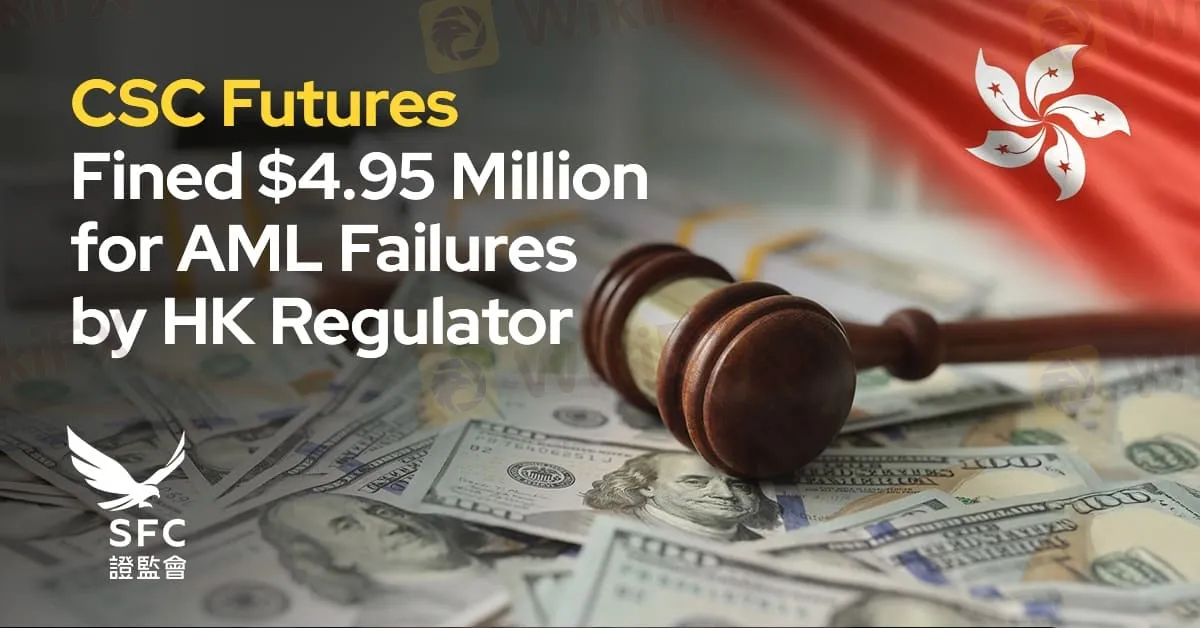简体中文
繁體中文
English
Pусский
日本語
ภาษาไทย
Tiếng Việt
Bahasa Indonesia
Español
हिन्दी
Filippiiniläinen
Français
Deutsch
Português
Türkçe
한국어
العربية
CSC Futures Fined $4.95 Million for AML Failures by HK Regulator
Abstract:The Securities and Futures Commission (SFC) of Hong Kong has taken disciplinary action against CSC Futures (HK) Limited (CSC), imposing a fine of $4.95 million for significant lapses in adhering to anti-money laundering (AML) and counter-financing of terrorism (CFT) regulations.

The Securities and Futures Commission (SFC) of Hong Kong has taken disciplinary action against CSC Futures (HK) Limited (CSC), imposing a fine of $4.95 million for significant lapses in adhering to anti-money laundering (AML) and counter-financing of terrorism (CFT) regulations. These breaches occurred between January 2017 and December 2018, during which CSC was found to have failed in key compliance areas concerning its clients trading activities.
The SFC‘s investigation revealed that CSC did not conduct the necessary due diligence on Customer Supplied Systems (CSSs) used by 100 of its clients for placing orders during the material period. This lack of scrutiny meant that CSC was unable to properly evaluate and mitigate the risks associated with money laundering (ML), terrorist financing (TF), and other financial crimes. The use of CSSs, which allow clients to interface with the company’s trading systems, posed potential risks that went unmonitored, leaving the firm vulnerable to misconduct.

Another critical finding by the SFC concerned irregularities in deposit patterns in five client accounts. The investigation showed that the deposits made into these accounts were inconsistent with the clients declared financial profiles, raising concerns over possible ML/TF risks. Despite these red flags, CSC failed to detect, investigate, or properly address the discrepancies due to inadequate monitoring systems. This failure to implement an effective oversight mechanism meant that suspicious activities could occur without the necessary checks.
The SFC concluded that CSC‘s internal systems and controls during the relevant period were not only inadequate but also ineffective in preventing risks related to AML/CFT. Specifically, the company did not ensure full compliance with Hong Kong’s Anti-Money Laundering and Counter-Terrorist Financing Ordinance, the AML Guidelines, and the SFCs Code of Conduct, all of which set critical standards for financial firms to follow.
In determining the severity of the penalties, the SFC considered several factors. It highlighted that CSC‘s lapses were serious as they could potentially undermine public confidence in the market and damage its integrity. Given the firm’s failure to implement robust AML/CFT measures, the SFC determined that disciplinary action was necessary to reinforce the importance of compliance and risk management within the financial sector.
However, the regulator also acknowledged that CSC cooperated with the investigation and has an otherwise clean disciplinary record. This cooperation likely influenced the SFC's decision on the penalty, but the firms failures in monitoring client activities and implementing sufficient controls were deemed serious enough to warrant the substantial fine.

Disclaimer:
The views in this article only represent the author's personal views, and do not constitute investment advice on this platform. This platform does not guarantee the accuracy, completeness and timeliness of the information in the article, and will not be liable for any loss caused by the use of or reliance on the information in the article.
Read more

OctaFX Flagged by Malaysian Authorities
OctaFX has been officially listed on warning lists by both Bank Negara Malaysia (BNM) and the Securities Commission Malaysia (SC). These alerts raise serious concerns about the broker’s status and whether it is legally allowed to operate in Malaysia.

TradingPRO: A Closer Look at Its Licences
In an industry where safety and transparency are essential, the regulatory status of online brokers has never been more important. For traders seeking to protect their capital, ensuring that a platform operates under recognised and stringent oversight can make all the difference. Keep reading to learn more about TradingPRO and its licenses.

Oil Price Breakout Incoming? Investors Should Stay Alert
Oil prices are hovering around a critical level, with potential yet to be fully unleashed. Investors must prepare for sudden changes.

New SEBI Regulations on Intraday Trading
The Securities and Exchange Board of India (SEBI) has implemented revised regulations on Intraday trading, with effect from November 20, 2024. These regulations are meant to lessen risks and prevent speculative trading practices.
WikiFX Broker
Latest News
SkyLine Guide 2025 Malaysia: 100 Esteemed Judges Successfully Assembled
Vantage Markets Review 2025: Trusted Forex and CFD Trading Since 2009
Why STARTRADER Is Popular Among Traders?
A Guide to Intraday Forex Trading You Can't Miss Out
CONSOB Blocks Access to 13 Unauthorized Investment Websites
TradingPRO: A Closer Look at Its Licences
The world could be facing another ‘China shock,’ but it comes with a silver-lining
New SEBI Regulations on Intraday Trading
Everything You need to know about Barath Trade
IronFX Broker Review 2025: A Comprehensive Analysis of Trustworthiness and Performance
Currency Calculator


